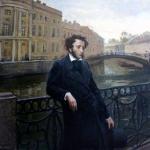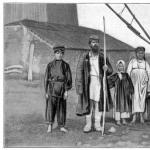Analysis of “Conversation between a bookseller and a poet” Pushkin. Analysis of Pushkin’s poem “Conversation of a bookseller with a poet Conversation of a bookseller with a poet” conclusion
Alexander Sergeevich Pushkin quite often in his poems addressed the theme of the poet and poetry, the theme of creativity. It is no secret that he was one of the first to start making money from his poetry and turned his passion into a profession. In the poem “Conversation between a bookseller and a poet,” the lyrical hero expresses a very precise thought: “Inspiration is not for sale, but you can sell a manuscript,” thereby justifying the masters of words who make money from their gift.
The poem was written during A.S. Pushkin’s stay in Mikhailovsky. Initially, it was intended as a preface to the novel in verse “Eugene Onegin”.
After his resignation, the poet writes a letter to his friend Kaznacheev, where he states that thanks to his creativity he earns much more than when he was in public service. Later, Alexander Pushkin creates this poem, in which he puts the same thought.
Genre, direction and size
During the period of A.S. Pushkin’s stay at Mikhailovsky, a turning point in the author’s work occurred. The poem “Conversation between a bookseller and a poet” marks the transition from romanticism to realism. The desire for a better world is replaced by the desire to reflect reality.
The poem is written in the unusual form of a dialogue between a bookseller and a poet. Replies follow one after another. The poetic text is written in iambic tetrameter with cross rhyme (abab).
Images and symbols
A bookseller and a poet who talk with each other are two sides of Pushkin himself. The bookseller is ready to buy poems from the poet. In his opinion, for a creative person, writing poetry is fun. So why not combine business with pleasure and start selling your works?!
- The poet recalls those times when he wrote from inspiration and did not seek payment for his poems.
- The bookseller emphasizes that everything has changed for the author since he became famous. Now many people want to buy his works.
- The Creator declares that it is better to be unknown to anyone. For him, fame is more of a punishment than a reward.
- To which the publisher replies that Zhukovsky and Byron thought the same thing, but this did not stop them from making money on their work. Does the poet really not have someone to whom he could dedicate his poems?
- To which he replies that there is no need to disturb the heart. The poet had a lover who rejected him. He emphasizes that even if he wrote for her, only she could understand the meaning of his text, but for the public it remained hidden. The Creator, having left the light and his muse, wants to choose freedom.
- To which the bookseller replies that in this century freedom and money are interconnected. The poem ends with an unrhymed line where the poet agrees to his interlocutor’s proposal.
- the importance of creativity in the life of a poet,
- perception of creativity as a way to earn money,
- freedom of creativity.
- “wonderful dowry”;
- “wonderful sounds”;
- "sweet gifts";
- "quiet flowing river"
- "feast of imagination";
- personification of “the soul preserves.”
This dialogue can be interpreted allegorically: the seller is the devil, the poet is the bright side, or one personifies harsh reality, and the second - sublime dreams. Pushkin is closer to the second option, because it was not because of a good life that he began to look for additional income. These are the realities of the time: either you condemn yourself and your family to bread and water, or you are looking for a way to provide for them, partly sacrificing your interests. Alexander Sergeevich was a responsible person; he would not allow himself to throw his family and his reputation into the millstone of abstract ideas.
Themes and moods
Main themes of the poem:
The creator also talks about the difference in worldviews and callings, which are sometimes forced to coexist in the same mind. For a poet, his poems are an expression of his inner experiences. For a bookseller, this is a product that can be sold profitably and earn good money.
The mood of the work is harmonious and calming. The author comes to terms with the need to make money from what he writes.
main idea
The poem emphasizes that the poet is forced to act as time dictates to him, this is the meaning of the poem. And if creativity brings good income, why not take advantage of it. However, this does not mean that the creator abandons his principles and writes to order something that contradicts his inner convictions. He stays true to himself.
The main idea of the work is that you need to be able to compromise, find answers to the most important questions within yourself, without being embarrassed by frank confession. Sometimes it’s worth thinking about whether it’s right to stay in your dreams without emerging? After all, in reality, you are not alone in the world, you need to take into account not only your desires, but also your obligations towards loved ones and the same society.
Means of artistic expression
The text is replete with tropes. Among them are epithets:
Metaphors:
Metonymy: “the eyes read.”
Interesting? Save it on your wall!The poem “Conversation between a bookseller and a poet” was created in September 1824 in Mikhailovskoye. This period of Pushkin’s work is characterized by a transition to harsh realism, so the work contains the motif of farewell to romanticism.
The poem was written on the topical topic of the time, the perception of literary work as a profession and a way to earn a living. These questions acutely worried the author, since he, struggling against the aristocratic prejudices of his social environment, was one of the first to begin to live on literary earnings.
The work “Conversation of a Bookseller with a Poet” refers to syllabic-tonic versification; its size is iambic tetrameter with cross rhyme, which makes it easy to read.
The poem represents a duel between a romantic poet and a pragmatic bookseller, a representative of the “age of the merchant.” In the dialogue of the characters, a sharp contrast is given between “poetry” and “prose” in the broad sense of these words: “sublime”, romantic ideas about reality - “feast of imagination”, “wonderful dreams”, “fiery delights” - and sober, “prosaic” perception life.
The bookseller considers poetry an easy game, a self-indulgence that pays well if you put it in the service of people in power or society ladies. In the speech of a pragmatist, the author uses epithets: “a new fruit of mental inventions”, “sweet-sounding creations”, “dusty heaps of stale prose and poetry”, “an annoying ringing”, metaphors: “the iron age”, “while the imagination boils and seethes on the flame of labor” , inversion and lexical repetition:
...The reasons for your distress
I can't know; but exceptions
Is it really not for lovely ladies?
Is it really not worth it?
No inspiration, no passion...
Thanks to artistic techniques, the bookseller's speech is contrasted with the poet's language - exciting, passionate and indifferent, with many sublime words. The author uses comparisons: “from people, like from graves”, “eyes like the sky”, “like a deity, she doesn’t need it”; metaphors: “and I did not humiliate the muses of sweet gifts with shameful bargaining”, “my life rushes silently”, “the faithful lyre”, “one would burn in the heart with a lamp of pure love”, “the joys of crazy youth”, “the groan of the lyre”; epithets: “tender mind”, “stingy guardian”, “proud mind”, “magic lips”, “sweet sounds”; rhetorical questions and lexical repetitions.
A special place in the poet’s speech is occupied by the description of Russian nature, which A.S. Pushkin loved so much. And again the author uses figurative and expressive means of language to create colorful images and landscapes: “shelters of rocks
and the dark shelter of solitude”, “the noise of the forests or a violent whirlwind”, “the whisper of a quiet river”, “the muffled rumble of the sea”, “the living melody of the orioles”.
The dialogue between “romance” and “pragmatism” ends with the complete victory of the bookseller, which is clearly emphasized by a bold stylistic device. The poet switches from enthusiastic speeches to the dry language of a commercial transaction, and poetic speech gives way to prose: “You are absolutely right. Here's my manuscript. Let's agree." This technique symbolizes the desire to free oneself from groundless and fruitless dreams, keeping intact one’s inner freedom and the incorruptible conscience of the artist: “Inspiration is not for sale, // But you can sell the manuscript.” The formula expressed in antithesis will determine the attitude to creativity in the “age of the merchant” not only of Pushkin himself, but also of subsequent Russian classic writers.
Other works on the topic:
The poem “Village” was written by Pushkin in 1819, during the so-called “St. Petersburg” period of his work. For the poet, this was a time of active participation in the socio-political life of the country, visiting the secret union of the Decembrists, friendship with Ryleev, Lunin, Chaadaev. The most important issues for Pushkin during this period were the social structure of Russia, the social and political lack of freedom of many people, the despotism of the autocratic-serf system of government...
In the lyrics of A. S. Pushkin, the theme of the poet and poetry occupies a very important place. The interest is quite understandable. Pushkin to this topic. One of the most brilliant poets of world significance, perfectly familiar with the poetry of all times and peoples, who devoted his entire life to poetry.
Poem by A.S. Pushkin's "Madonna" was written in 1830. By this time, one of the first beauties of Moscow, Natalya Goncharova, with whom the poet was in love, became Pushkin’s bride. It is not surprising that the poem is dedicated specifically to
Alexander Sergeevich Pushkin can rightfully be considered the greatest Russian poet who opened a golden page in the history of Russian literature. Peering into the depths of the soul with a stern gaze. A special place in creativity.
Ideas of freedom permeate all the lyrics. Pushkin. Their content is replenished, rethought and modified throughout the poet’s entire creative path. For example, in the early period of his literary activity in his lyceum years, the idea of freedom was about.
Nowadays N.M. Yazykov became, as it were, a poet “for the elite,” although his poems are essentially folk and the development of the Russian language requires the contribution he made to the treasury of our art.
V.V. Mayakovsky was an excellent satirist poet. Among his satirical works is the poem “The Seated” (1922), which denounces bureaucracy. The very title of the poem already contains its deep meaning.
The main motives of Pushkin's lyrics The genius of Pushkin was far ahead of his time. The poet's lyrical works reflect the most significant problems of his contemporary life, and outline themes that will be continued in the literature of his followers. Pushkin's poetry is a whole world in which every reader can find something that concerns him personally.
The love lyrics of A. S. Pushkin constitute a significant part of the poet’s entire poetic heritage. It contains stanzas of revelation, stanzas of Pushkin’s declaration of love, tender messages, quatrains for the album, fleeting sketches of a flared feeling, and truly magical sonnets in depicting the subject of the poet’s ardent passion.
In the summer of 1824, A.S. Pushkin, at the instigation of his enemies, was sent by the St. Petersburg authorities to the Pskov village of Mikhailovskoye. Even in Odessa, the poet was overcome by gloomy moods. “It’s boring... this is the refrain of my life,” he wrote to his friend Delvig, while calling himself “an exiled slave.” And then there was still to be separation from the sea, which supported Pushkin’s creative forces throughout the entire southern exile.
Analysis of the poem by A. S. Pushkin “The Burnt Letter” Author: Pushkin A.S. The poem “The Burnt Letter” was written in 1825, during Pushkin’s exile to the village of Mikhailovskoye.
Analysis of the poem by V.V. Mayakovsky "An unusual adventure that happened to Vladimir Mayakovsky in the summer at the dacha" Author: Mayakovsky V.V. Poem by V.V. Mayakovsky “An extraordinary adventure that happened to Vladimir Mayakovsky in the summer at the dacha” was written in 1920. The victory of the revolution raised millions of people to active historical life.
A brief analysis of Lermontov's poem "The Death of a Poet" Author: Lermontov M.Yu. When analyzing the first stanza, it is important to note that Pushkin’s fate is interpreted as the fate of the poet in general and is framed in romantic categories: “slandered by rumor,” “thirst for revenge,” “hung with his proud head,” “revolted... against the opinions of the world,” “free, bold gift", "wonderful genius", "solemn wreath".
Analysis of Pushkin's poem "Village" Author: Pushkin A.S. In addition to the excited, indignant description of the horrors of serfdom and the expression of fervent hope for the liberation of the peasants by order of the tsarist government, these poems contain a dispute and polemic between the young Pushkin and his teachers in the field of poetry - Karamzin, Batyushkov, Zhukovsky.
Analysis of the poem by A.S. Pushkin "I erected a monument to myself not made by hands..."
Analysis of the poem by A.S. Pushkin "Monument" Author: Pushkin A.S. A year before his death, as if summing up his poetic activity, A.S. Pushkin wrote “Monument”. In its theme and structure, it is close to the poem of the same name by Derzhavin, who in turn took an ode from the ancient Greek poet Horace as a model.
Analysis of the poem by A.S. Pushkin “I visited again” Author: Pushkin A.S. In 1835, Pushkin visited Mikhailovsky for the last time - at his mother’s funeral. In the same year, the poem “Once again I visited...” was written - a poetic summary of life. The poem absorbs all life experience, but does not repeat it, but transforms it.
The theme of the poet and poetry in the lyrics of A. S. Pushkin Author: Pushkin A. S. This traditional theme worried such poets as Horace, Byron, Zhukovsky, Derzhavin and others. A. S. Pushkin used the best achievements of world and Russian literature in his poetry. This was most clearly manifested in the theme of the purpose of the poet and poetry.
Analysis of A. S. Pushkin's poem "". To Chaadaev. This poem dates back to 1818, and was published in 1829 without Pushkin’s knowledge, although before that it had become famous in handwritten copies. Dedicated to Pyotr Yakovlevich Chaadaev, one of Pushkin’s friends.
Poem by A.S. Pushkin “The Sun of Day Has Gone Out” (perception, interpretation, evaluation) Author: Pushkin A.S. In Pushkin’s creative heritage, along with the themes of “poet and poetry”, love and civil lyrics, it is customary to highlight philosophical lyrics. It includes poems in which the poet expresses his view on the nature of the universe, on the place of man in it.
Analysis of the poem by M.Yu. Lermontov "The Death of a Poet" Author: Lermontov M.Yu. M.Yu. Lermontov’s poem “The Death of a Poet” was written in 1837. It is connected with the death of Pushkin. The main theme of the poem is the conflict between the poet and the crowd.
Brief analysis of the poem "To Chaadaev" Author: Pushkin A.S. The theme of freedom and the fight against autocracy is heard in the poem “To Chaadaev.” Written in the form of a friendly message, it reflects the views and political sentiments that united Pushkin with his friend P. Ya. Chaadaev and with all the leading people of that time.
Analysis of Pushkin's poem "Village" Author: Pushkin A.S. In the poem "Village" Pushkin speaks out against serfdom. In order to more clearly and sharply emphasize all the injustice and cruelty of serfdom, Pushkin resorts to the technique of opposition in constructing the poem.
Analysis of the poem by A.S. Pushkin "Arion" Author: Pushkin A.S. Analysis of the poem by A.S. Pushkin "Arion". There were many of us on the boat; Others strained the sail,
This rather traditional theme worried such poets as Horace, Byron, Zhukovsky, Derzhavin and others. Pushkin used the best achievements of world and Russian literature in his poetry. This was most clearly manifested in the theme of the poet and poetry.
One of the most mysterious and captivating poems by A.S. Pushkin's poem "I Remember a Wonderful Moment" is rightfully considered. It is dedicated to A.P. Kern, niece P.A. Osipova. Pushkin met her in St. Petersburg in 1819.
A.S. Pushkin is the “sun of Russian poetry”, its great beginning and perfect expression. Philosophical understanding of the leading and universally significant problems for all mankind in the lyrics of the twenties and in the poems of Pushkin of a later period, analysis of works.
Pushkin's poems have been known to each of us since childhood. First, we hear pleasant lines from the lips of our parents, then, having learned to read, we slowly begin to independently comprehend their exciting rhythm, trying to guess the elusive meaning and significance. The lyrical work “A Conversation between a Bookseller and a Poet” dates back to the mature period of Alexander Sergeevich’s work, when he realized the desire to earn his living by writing. The difficulties he encountered, including the lack of understanding of those around him, gave rise to numerous thoughts and served as an incentive to write a poem. In the work, the author tries to understand how to proceed. The article provides a detailed analysis of it.
“A Conversation between a Bookseller and a Poet” will perhaps prompt the thoughtful reader to think about the eternal and encourage him to rethink his values.
Poem composition
The lyrical work is structured in such a way that it is more convenient for the reader to perceive it: the stanzas of the poet’s and the bookseller’s answers alternate and together form a solid dialogue that seems endless. To understand the idea of this mysterious conversation, you need to be able to plunge into its essence, experience Pushkin’s main motives for yourself, and recognize the depth of his lyrics.
As we read, we often begin to empathize with the poet and take his side. This state occurs when the addressee finds some consonance of his life with the thoughts and feelings that the author is talking about.
The state of the lyrical hero
Pushkin created “A Conversation between a Bookseller and a Poet” with special trepidation and put a lot of personal experiences into it. Although the lyrical hero behaves confidently in the dialogue, he actually doubts himself very much. The conversation resembles a verbal duel, where the truth is on one side or the other. The poet puts forward many arguments precisely because he is trying to prove to the world the importance and significance of true art. He wants to serve real literature, to become a voluntary artist of the word.

The bookseller is in no hurry to argue with him, he only puts forward quite reasonable arguments, shows what is important to society. The poet’s sensitive soul thirsts for new impressions: he needs “wonderful dreams,” deep thoughts and aspirations like air. This can be understood through analysis. “A Conversation between a Bookseller and a Poet” shows the purpose of a man of art, his role on earth: to serve the world with his talent, although his contemporaries are not always ready to accept the talent addressed to them.
Freedom theme
Perhaps this is the key moment, the center of the “duel” between the sublime dreamer and the layman. The poet writes based on inspiration; payment is secondary for him. The interlocutor believes that freedom is impossible without money, as the analysis shows. “A Conversation between a Bookseller and a Poet” reveals the vital relationship of a talented person with the world, showing how vulnerable and strong he is at the same time. One who is endowed with an extraordinary talent is like a white swan: his gigantic wings prevent him from walking on earth, but in heaven he is powerful and great.

Pushkin wrote “A Conversation between a Bookseller and a Poet” to show the enormous strength of a creative person: he can endure a lot. The most important thing for him is truth. A true poet is ready to pay any price for freedom, even if it significantly exceeds his actual earnings. The author gives the writer the voice of eternity, emphasizes his focus on the future and desire to serve the muse.
Bookseller's intentions
Anyone associated with publishing looks at creativity from the opposite side. What matters here is not so much the strength and greatness of the talent, but the question of whether the work will sell. If commercial success is not expected, then no one will take risks and invest money in promoting a dubious project. A bookseller knows how to calculate the benefits of his business, and for him, the degree of success and popularity of the author is fundamental, because this is how he earns money. For him, a book is a commodity and a source of income.

Pushkin's poems, as always, are filled with special psychologism and drama. The author of these lines emphasizes the inevitable suffering of a creative person, his difficulties on the path to becoming a writer.
The poet's feelings. Analysis
“A Conversation between a Bookseller and a Poet” touches on the deep personal experiences of Alexander Sergeevich himself and reflects the degree of his desire to express himself in creativity. Often the desire for self-expression is accompanied by rejected love, misunderstanding on the part of society and even loved ones. If someone thinks that this is very easy, let him try to experience all these dramas, which can often devastate so much that many people would give up much sooner. However, people capable of art are as resilient as they are talented.

Freedom is the main aspiration of a poet, of any creative person, because only in this state can one truly create and feel infinitely happy. Talents are willing to pay very dearly for it.
General meaning
The poem “Conversation between a bookseller and a poet” contains deep philosophical meaning. It raises important questions about the meaning of life and the purpose of man on earth. The conversation between a writer and a publisher turns into an eternal dispute that continues to this day. The work does not lose its relevance even today, when the issue of promoting young authors is very acute, some of them are forced to publish at their own expense.
Composition
The poem “Conversation between a bookseller and a poet” was created in September 1824 in Mikhailovskoye. This period of Pushkin’s work is characterized by a transition to harsh realism, so the work contains the motif of farewell to romanticism.
The poem was written on the topical topic of the time, the perception of literary work as a profession and a way to earn a living. These questions acutely worried the author, since he, struggling against the aristocratic prejudices of his social environment, was one of the first to begin to live on literary earnings.
The work “Conversation of a Bookseller with a Poet” belongs to syllabic-tonic versification; its size is iambic tetrameter with cross rhyme, which makes it easy to read.
The poem represents a duel between a romantic poet and a pragmatic bookseller, a representative of the “age of the merchant.” In the dialogue of the characters, a sharp contrast is given between “poetry” and “prose” in the broad sense of these words: “sublime”, romantic ideas about reality - “feast of imagination”, “wonderful dreams”, “fiery delights” - and sober, “prosaic” perception life.
The bookseller considers poetry an easy game, a self-indulgence that pays well if you put it in the service of people in power or society ladies. In the speech of a pragmatist, the author uses epithets: “a new fruit of mental inventions”, “sweet-sounding creations”, “dusty heaps of stale prose and poetry”, “an annoying ringing”, metaphors: “the iron age”, “while the imagination boils and seethes on the flame of labor” , inversion and lexical repetition:
...The reasons for your distress
I can't know; but exceptions
Is it really not for lovely ladies?
Is it really not worth it?
No inspiration, no passion...
Thanks to artistic techniques, the bookseller's speech is contrasted with the poet's language - exciting, passionate and caring, with many sublime words. The author uses comparisons: “from people, like from graves”, “eyes like the sky”, “like a deity, she doesn’t need it”; metaphors: “and I did not humiliate the muses of sweet gifts with shameful bargaining”, “my life rushes silently”, “the faithful lyre”, “one would burn in the heart with a lamp of pure love”, “the joys of crazy youth”, “the groan of the lyre”; epithets: “tender mind”, “stingy guardian”, “proud mind”, “magic lips”, “sweet sounds”; rhetorical questions and lexical repetitions.
A special place in the poet’s speech is occupied by the description of Russian nature, which A. S. Pushkin loved so much. And again the author uses figurative and expressive means of language to create colorful images and landscapes: “shelters of rocks
And the dark shelter of solitude”, “the noise of the forests or the violent whirlwind”, “the whisper of a quiet river”, “the muffled rumble of the sea”, “the living melody of the orioles”.
The dialogue between “romance” and “pragmatism” ends with the complete victory of the bookseller, which is clearly emphasized by a bold stylistic device. The poet switches from enthusiastic speeches to the dry language of a commercial transaction, and poetic speech gives way to prose: “You are absolutely right. Here's my manuscript. Let's agree." This technique symbolizes the desire to free oneself from groundless and fruitless dreams, keeping intact one’s inner freedom and the incorruptible conscience of the artist: “Inspiration is not for sale, // But you can sell the manuscript.” The formula expressed in antithesis will determine the attitude to creativity in the “age of the merchant” not only of Pushkin himself, but also of subsequent Russian classic writers.
Other works on this work
Analysis of A. S. Pushkin’s ode “Liberty” Analysis of the poem “Feasting Students”“Conversation between a bookseller and a poet” Pushkin
Analysis of the work - theme, idea, genre, plot, composition, characters, issues and other issues are discussed in this article.
History of creation
In September 1824, Pushkin arrived in Mikhailovskoye and soon wrote “Conversation between a bookseller and a poet.” The poem was published as a preface to Eugene Onegin. Pushkin put into poetry the thought expressed in the summer of the same year in a letter to the Treasurer. Talking about his retirement, the writer does not regret either his career or his salary, because he earns more through literary work: “If I still write at the free whim of inspiration, then, having written poetry, I already look at them only as a commodity... » Pushkin was the first to start making money through literary creativity, that is, he became a professional poet.
Literary direction, genre
In “A Conversation between a Bookseller and a Poet,” the crisis of Pushkin’s romanticism was revealed. It is not for nothing that Pushkin published it as a kind of introduction, a mood for a realistic novel in verse. This poem is a farewell to romanticism and the beginning of a realistic period in the poet’s work. The problem of freedom of creativity raised in the poem allows us to classify it as philosophical poetry.
Theme, main idea and composition
The poem is a dialogue between a romantic poet and a bookseller (today we would say bookseller). These are the two essences of Pushkin himself: romantic and pragmatic. So we can consider the poem an internal monologue of the facets of the lyrical hero.
The bookseller begins the dialogue. In a playful and ironic manner, he pays tribute to the talent of the poet, the favorite of the muses and graces. The bookseller is ready to pay any price set for a new poem by the creator.
The poet recalls that former time of unity with nature, when he was not ready to share his feelings with the crowd, kept the gifts of the muse, and did not trade them.
The bookseller objects that the poet gained fame by selling poetry.
The poet does not strive for fame and believes that a true poet should die in obscurity.
The bookseller cites the example of the famous romantics, Zhukovsky and Byron, who also despised fame, but were not poor or unknown. The bookseller proves that the poet cannot remain silent, because he must influence the destinies of people, and asks him to write at least for women.
The poet considers admiration for women to be a mistake of youth: “I am ashamed of my idols.” The only woman who is worthy of the poet's love rejected the outpouring of his earthly delights.
The bookseller asks the climactic question about what is most important to the poet, and receives a one-word answer: freedom.
The bookseller's last remark is proof that in the “merchant age, in the iron age,” “there is no freedom without money.” The bookseller persuades the poet to sell the manuscript, proving to him that the process of creation itself is important for the creator, while published works are useful for readers.
The bookseller manages to convince the poet, so that he switches to the language of prose.
The theme of the poem is creative freedom.
The main idea is expressed in the words of the bookseller: “Inspiration cannot be sold, but you can sell a manuscript.”
Meter and rhyme
The poem is written in iambic tetrameter. Female and male rhymes alternate. Cross rhyme.
Language, tropes and images
In the poem, the arguers represent different ideas, different philosophies. During the argument, the bookseller convinces the poet. The entire system of images and the language of the poem are subordinated to this.
In the first remark, the bookseller appears as a person who values poetry only for its commercial value. Hence the dismissive diminutive words: poems, leaves.
The poet's speech in the first remark is very different from the bookseller's speech. The romantic mood creates many epithets and metaphorical epithets: poet careless, dark shelter of solitude, bright visions inexplicable beauty, gentle mind, chapel dilapidated, wonderful legend...
There are metaphors in the replica rock shelters, feast of the imagination, and it ends with parallelism: the poet preserves his creativity like a lover preserves the gifts of his beloved.
The bookseller tries to speak to the poet in his own language, but he applies epithets to prosaic things: dusty communities stale prose and poetry, windy reward. Phrase you broke up combines metonymy and metaphor.
The bookseller’s words become more and more poetic, and in the climax he speaks no worse than a poet: epithets of the century iron, impatient readers, skinny singers; metaphors century is a huckster, fame is a bright patch on the singer’s shabby rags, food for satire.
The poet, on the contrary, spoke in the dry language of office work. Both philosophical positions coexist wonderfully in Pushkin’s personality.






